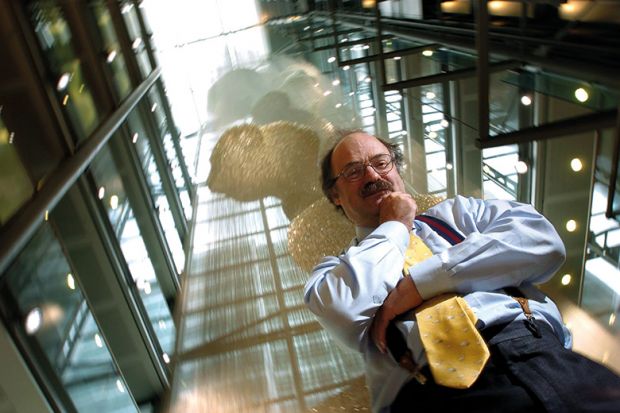Ensuring that UK-based researchers can continue to work closely with European partners after Brexit has been described as a “very high priority” by the chief executive designate of the country’s new funding body, but he warned that it was “too early to speculate” about what the future framework for collaboration might look like.
In an interview with Times Higher Education, Sir Mark Walport, the inaugural head of UK Research and Innovation and the government’s chief scientific adviser, said that the UK’s decision to leave the European Union was an undeniable “external challenge” to the higher education sector.
“There is the challenge that Brexit brings, there’s no denying that, and it’s extremely important to get the message out that the UK is open to Europe, the world, to researchers, innovators from everywhere,” he said. “It’s a very high priority that the research and innovation community remain able to work closely in every way with their partners in Europe and across the world.
“The job of UKRI is to make it as easy as possible for the best research, best innovation, to happen in the UK, and part of that is ensuring that our international links and partnerships remain as strong as they ever have been.”
However, with the latest round of Brexit negotiations having just ended, the sector has reiterated the importance of retaining strong research links with the EU – including access to funding programmes beyond Horizon 2020, freedom of movement for scientists, and membership of organisations such as the European Atomic Energy Community (Euratom).
Concern has already been raised about the government’s commitment to severing ties with the European Court of Justice (ECJ), which could jeopardise UK research activity in the EU, and the UK government has already decided to withdraw from Euratom because of the ECJ’s jurisdiction over the programme.
Chi Onwurah, the shadow minister for industrial strategy, science and innovation, said that research issues were not being addressed adequately in the negotiations.
“There isn’t a clear negotiating stance apart from bluster,” she told THE. “We have competing views and voices. What we saw…with Euratom is that there are ideological red lines that don’t reflect the nation’s interest and science issues.”
THE understands that the UK government is considering all options around EU research activity: as an associated member, with access to EU programmes, a “third country” with more limited access, or even through the creation of a new UK programme.
Ms Onwurah said that Labour “would seek to remain in Horizon 2020 and its successors, and retain membership [of] organisations such as Euratom and the EU medicines agency”.
Sir Mark said that the government “recognised very strongly” the importance of minimising the effect of Brexit, but he added that it was “too early to speculate on what...the details of any final settlement with Europe...might be”.
Alistair Jarvis, acting chief executive of Universities UK, said that the government was “sending the right signals” but that it needed to move to “firm commitments on policy”.
“I wouldn’t be satisfied if we were sitting here five years from now and we had the same level of international collaboration as we have now,” he said. “We should be aiming to have more. That’s a combination of maintaining strong relationships with European partners and also growing those outside.”
Sarah Main, executive director of the Campaign for Science and Engineering, said that there was a “disconnect” between “reassuring words” and “the impact on people’s lives”. She added that scientists and engineers “still feel anxious...particularly on mobility”.
Mr Jarvis said that the government needed to guarantee the residency and work rights of current EU nationals “as soon as possible” before creating a post-exit EU immigration regime with “minimal barriers” to the “movement of highly skilled talent”.
He said that the recent announcement of the £100 million Rutherford Fund to attract global researchers was therefore “positive”.
Sir Mark said that the fund, which will be administered in part by UKRI, was a “statement” of intent for the UK to remain a “very significant global player” in research.
However, Kurt Deketelaere, secretary general of the League of European Research Universities, said that this was derisory in comparison with the money that UK researchers could garner from EU funding bodies such as the European Research Council.
“The UK government thinks that just throwing at universities, something [like] £100 million, to attract top researchers from abroad [is satisfactory?]” he said. “This is peanuts compared to what the ERC means for the UK.”
Stephen Curry, professor of structural biology at Imperial College London, added that the “plight of EU researchers currently working in the UK” had not been addressed by either the high-level forum or the Rutherford Fund.
“I am concerned at the likely haemorrhaging of talent,” he said. “We are at the mercy of Britain’s negotiating team. I would be very interested to know what advice [Sir Mark] is giving. I hope that he is going all out to find a way to keep us plugged into EU research funding and networks.”
Register to continue
Why register?
- Registration is free and only takes a moment
- Once registered, you can read 3 articles a month
- Sign up for our newsletter
Subscribe
Or subscribe for unlimited access to:
- Unlimited access to news, views, insights & reviews
- Digital editions
- Digital access to THE’s university and college rankings analysis
Already registered or a current subscriber?








